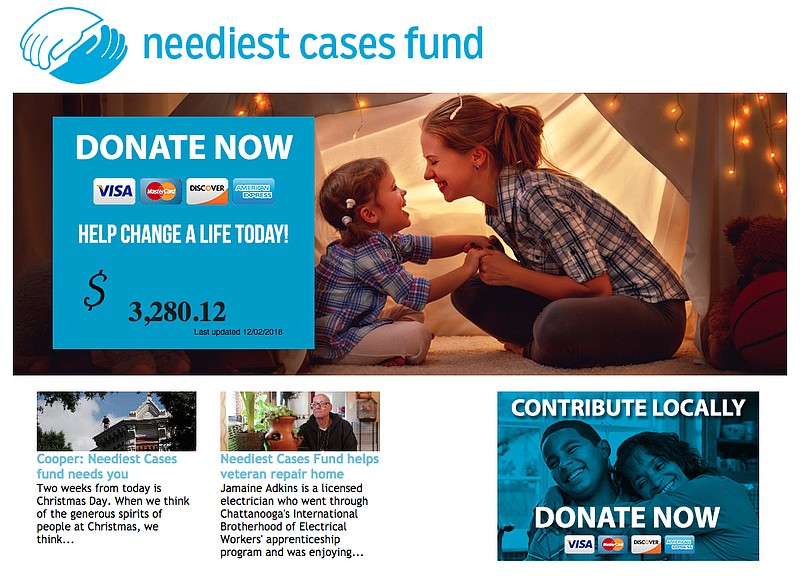DAYTON, Tenn. - The Times Free Press Neediest Cases Fund does the same work in Dayton and Rhea County as it does in Chattanooga and Hamilton County. People ask for help in the form of a one-time gift that will avert a family crisis.
» Mary Hovis lives in an apartment on Market Street with two adults and two children, is on short-term disability and is ready to go back to work. Recently, a tumor was discovered behind the eyes of one of her children, and Hovis didn't have the funds to travel to Nashville to see a specialist.

The Neediest Cases Fund provided her $200 in travel expenses.
» Lindsay Williams is a single mother of three with no child support. She provides for her family by working as many hours in retail as she can each month, but recently those part-time hours were cut back. She couldn't pay the power bill. Williams was referred to the United Way here when no funding was available at the Southeast Tennessee Human Resource Agency.
The Neediest Cases Fund filled a gap with $300 toward the bill.
» Kelly Mathis lives in Graysville, and her grandson was born needing machines to help him breathe. The medical conditions increased the financial burden for Mathis, including the fact the machines required electricity 24 hours a day. The child eventually died, but then came funeral expenses and the need for her granddaughter to live with her. At the end, there was simply no money to pay a simple water bill, and the Neediest Cases Fund met the $150 need.
"The Neediest Cases Fund for us is the last resort," said Christine Ralph, the executive director of the United Way of Rhea County. "Without the fund, we would have to turn away someone we really wanted to help."
The commonality of mission binds Ralph and her organization and the United Way of Greater Chattanooga, but that is where the likeness ends as the work of the two sister agencies seems much greater than the 35 miles that separate the two communities.
"We're smaller, so it is a lot more personal here," Ralph said. "I'm real stingy with our money. If I can get help from someone through the Neediest Cases Fund in Chattanooga, that helps me, because I can then take those few dollars and put them somewhere else."
"We have the same kind of poverty, but it's just not as visible because we are more spread out," said Cynthia Travis, who handles the Neediest Cases Fund.
Ralph and Travis are the only two people who work in a one-room storefront in downtown Dayton, which stands in contrast to the headquarters on Market Street of the United Way of Greater Chattanooga. Ralph and her board raise about $200,000 a year to serve 11 agencies and 65,000 residents, in contrast to the United Way in Chattanooga serving six counties and nearly 500,000 residents.
Ralph and Travis have been side by side for all 13 years of their United Way careers, and they have already announced they will retire together in three years. Both talk about how closely they scrutinize requests that come to them that qualify for the Neediest Cases Fund, and how important it is the fund is managed by the United Way of Chattanooga.
"We try to do our job on this end, but we can often get the [Neediest Cases] money from Chattanooga in a week or less," said Ralph, who attends a staff meeting at the United Way of Chattanooga once a month and attends the annual board retreat. "When we need something, they are there for us."
Like they were for Ricky Needham, whose wife is disabled. In the time between when Needham lost his job in Chattanooga and getting a new one in Dayton, the financial issues grew to the point that he and his wife faced eviction. Travis gathered the information and made an application for $300 to help with their rent issue. At the time, he volunteered to do odd jobs for others to pay back the help he received.
"For the amount of money we are able to gather up, we really help a lot of needy people in Rhea County," said Perry Massingill, who recently completed serving as chairman of the Rhea County United Way Board. "We try hard to divvy it up to places where the folks are the neediest."
The Neediest Cases Fund was started by Chattanooga Times Publisher Adolph Ochs in 1914 and is administered by the United Way of Greater Chattanooga. Contributions to the Neediest Cases Fund will continue through December, and you can donate to the fund online, visit timesfreepress.com/neediestcases. In addition, you can see Fund cases from this year and 2017.
Contact Davis Lundy at davislundy@aol.com.
